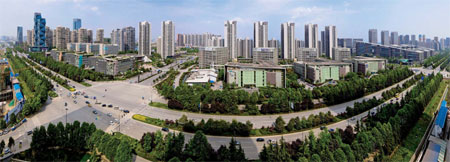Sweet spot for investment
Updated: 2012-11-09 08:54
By Zhao Yanrong and Li Yu (China Daily)
|
||||||||
|
A view of Tianfu Software Park in Chengdu, Sichuan province. Provided to China Daily |
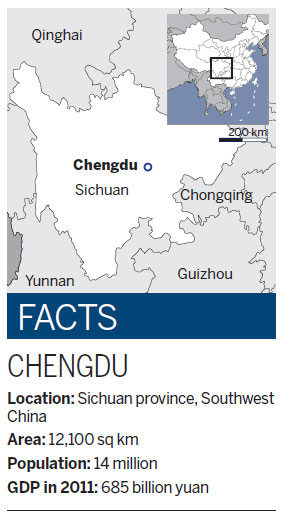
Robust industrial climate, rich talent bring foreign companies in droves to Chengdu
The glitzy skyscrapers and bustling shopping districts in Beijing and Shanghai are no longer the only barometers of foreign direct investment in China. That baton has instead passed to the western regions of China, where cities with better infrastructure and an abundant talent pool are stealing a march over their bigger peers.
The shifting paradigm is more than evident in the bustling Shuangliu International Airport in Chengdu where passengers and airplanes jostle for space, even as airport authorities contemplate adding more terminals, shops and runways to cater to the growing traffic.
The recently opened new terminal looks swankier with more luxury stores and other modern facilities designed to make the travel process smoother and faster.
Related reading: Navigating shipping success
Scores of taxis and buses make the journey between the airport and city center easier and faster. Along the busy expressway that runs from the airport to downtown, one can spot service shops set up by big automobile companies, even as bustling shopping malls elsewhere in the city are full of customers. The glitzy five-star hotels set up by big international brands such as Kempinski and Intercontinental are looking to expand further to cater to the jetsetters.
The word Chengdu has often proved to be a tough nut to crack for those who are not too comfortable with speaking Chinese - so much so that Chengdu often ends up being pronounced as "can do". But that is exactly the attitude the city has adopted in the past few years.
The busy airport and burgeoning passenger numbers are not Chengdu's only boast. It was already well known as the birthplace of pandas and a major culinary destination.
Chengdu, the fourth-busiest airport in China in terms of passenger numbers after Beijing, Guangzhou and Shanghai, is also a major logistics hub and a destination of choice for global financial services firms and manufacturing giants.
But it is the steadily increasing foreign direct investment from multinational companies that has propelled the lesser-known Chinese city into the big league. It is currently the only inland Chinese city that appears in the 2011 and 2012 "Annual Top 10 Best Foreign Investment Strategy Cities in Asia and the Pacific Region" list published by FDI-a magazine published by the UK-based Financial Times.
Next year the city will host the prestigious Global Fortune Forum, which will see several Fortune 500 firms and their top brass, along with heads of state and industry leaders, flocking to the city.
Industry experts aver that Chengdu's success can be best summed up in three words - "China's New Future".
The cumulative investment made by 215 Fortune 500 Global enterprises in Chengdu during the first six months of the year was 50 billion yuan ($8 billion; 6.27 billion euros), 28.7 billion yuan more than the same period last year.
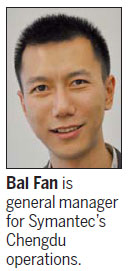
Cold beginnings
In 2007, when Bai Fan first arrived in Chengdu, things were not as hunky-dory as they are now. Alighting on a cold and blistery night at the Shuangliu airport, Fan found himself staring at empty aisles, deserted parking lots and hardly any taxis or buses. There were no foreign faces around, nor were there any signs of expatriate communities.
His shock was exemplified by an international school standing out like a sore thumb while checking out a large area of empty farmland as the prospective China office site for global software security firm Symantec. No one at the company headquarters in California had ever heard of Chengdu till then.
Over the next five years, Bai and his team toiled hard to be an integral part of the Chengdu High-tech Industrial Development Zone. All the office buildings conform to US standards and boast exceptional designs. Symantec has also set up a Security Response Center in Chengdu to support its other centers in Tokyo, Dublin and Culver City of Los Angeles.
"When you compare these five years with the 30 years that it took for Symantec to evolve as a global company, it does not seem to be a long period," says Bai. "But we have made tremendous achievements in China during these five years, with Chengdu being the vital cog in that journey."
Bai, the general manager for Symantec's Chengdu operations, can, however, rest assured on one aspect. He is no longer the only man standing in Chengdu. Surrounding him at the Tianfu Software Park are other multinational corporations such as IBM, Cisco and Dell.
Though hesitant and wary at first, many of these multinationals have decided to set up shop in Chengdu after being convinced by the city's "can do" abilities.
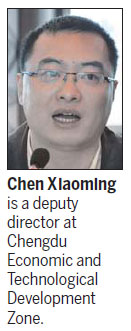
Different strokes
The real success of Chengdu, however, can be measured in the vast range of high-tech industries that have bases there. Companies from sectors as diverse as IT, new energy, new materials, bio-pharmaceuticals, aviation and aerospace, automobile, equipment manufacturing, petrochemical industry are present in Chengdu.
With an eye on attracting more foreign investment into these industries, the local government has invited some leading global enterprises to set up industry-specific clusters and parks in Chengdu.
The automobile industry is an ideal example of this cluster approach. There are 139 automobile enterprises in Chengdu, including Volvo, FAW Volkswagen and FAW Toyota.
At the Chengdu Economic and Technological Development Zone, more than 50,000 skilled workers work on various activities related to the auto industry - ranging from trade, exhibitions, entertainment, research and development to manufacturing of spare parts and whole vehicles.
In 2011, the total output value of the automobile enterprises in Chengdu was around 50 billion yuan. By 2015, the number is expected to reach 275 billion yuan, with annual production capacities of 1.5 million vehicles.
"We have a history of automaking in Chengdu, and therefore we have sufficient facilities and skilled people to support those major investment," says Chen Xiaoming, deputy director of the Automobile Investment Service Bureau at the development zone.
According to Chen, low logistics costs and easy access to other parts of China, coupled with the fast access to Europe and Southeast Asia, have proved irresistible for many global auto firms. "In addition, the presence of key players like China FAW Group, Volkswagen, Toyota and Geely, have brought many auto-related business and industries to this area," he says.
During the past 12 years, Chengdu has been at the forefront of western development in China and its average annual economic growth rate is the best among all 12 provincial capital cities in central and western areas.
As a trade and logistics center and major transportation and communications hub, Chengdu boasts the most developed aviation and railway system among central and western regions of China.
IBM, which opened a Global Delivery Center in the Tianfu Software Park in March 2008, is one of the multinational companies looking to grow further in Chengdu.
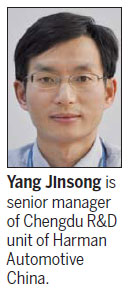
Talent power
Chengdu's biggest advantage perhaps lies in its diverse and abundant talent pool which gives room for companies to chart further expansion plans in the city. There are more than 50 educational institutions in Chengdu, including several top universities, such as Sichuan University, Southwest Jiaotong University, University of Electronic Science & Technology of China, and the Southwestern University of Finance and Economics.
Every year the city adds more than 150,000 graduates and more than 100,000 professional skilled workers to its labor pool.
It is also this advantage that prompted the world's largest car stereo manufacturer, Harman International, to set up a research and development center in Chengdu earlier this year.
According to Yang Jinsong, senior manager of Chengdu R&D unit of Harman Automotive China, the center reflects the company's utmost confidence in Chengdu.
"We are also looking to cash in on the vast talent pool here and plan to recruit at least 300 professionals specializing in car entertainment every year from Chengdu."
The relatively settled labor scenario is also another major draw for foreign companies. Gerold Amelung, the consul general for Germany in Chengdu, says that during the three months he has been in Chengdu, he has not received a single complaint or request for support. Amelung feels that it is an indicator of the robust industrial climate in Chengdu.
"All the German companies I have spoken to so far seem to be very happy with the investment environment and with the support they received here, especially in the many industrial parks around the city," he says.
The presence of more than 120 German companies in Chengdu has prompted the German Chamber of Commerce in China to set up a liaison office in the city.
"Chengdu has many geographical advantages and favorable climate conditions in addition to abundant talent. Chengdu has taken the lead across China in the past 10 years in building a standardized service-oriented economy," says Sheng Yi, vice-president of the Sichuan Academy of Social Sciences.
Contact the writers at zhaoyanrong@chinadaily.com.cn and liyu@chinadaily.com.cn
(China Daily 11/09/2012 page12)

 Relief reaches isolated village
Relief reaches isolated village
 Rainfall poses new threats to quake-hit region
Rainfall poses new threats to quake-hit region
 Funerals begin for Boston bombing victims
Funerals begin for Boston bombing victims
 Quake takeaway from China's Air Force
Quake takeaway from China's Air Force
 Obama celebrates young inventors at science fair
Obama celebrates young inventors at science fair
 Earth Day marked around the world
Earth Day marked around the world
 Volunteer team helping students find sense of normalcy
Volunteer team helping students find sense of normalcy
 Ethnic groups quick to join rescue efforts
Ethnic groups quick to join rescue efforts
Most Viewed
Editor's Picks

|

|

|

|

|

|
Today's Top News
Chinese fleet drives out Japan's boats from Diaoyu
Health new priority for quake zone
Inspired by Guan, more Chinese pick up golf
Russia criticizes US reports on human rights
China, ROK criticize visits to shrine
Sino-US shared interests emphasized
China 'aims to share its dream with world'
Chinese president appoints 5 new ambassadors
US Weekly

|

|
